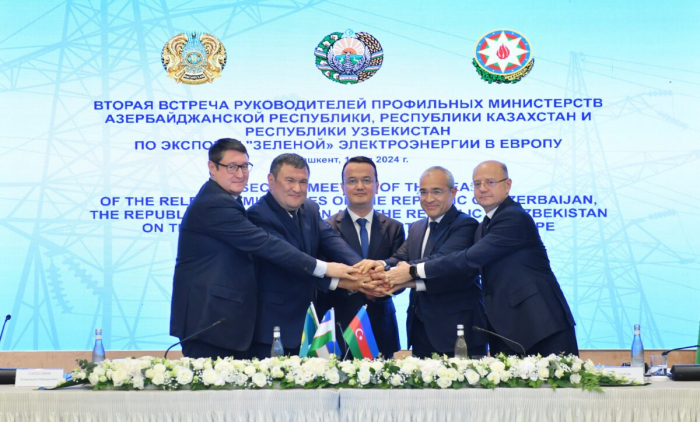On May 1, during the Tashkent International Investment Forum in Tashkent, Azerbaijan, Uzbekistan and Kazakhstan signed a memorandum of cooperation on merging the energy systems of the three countries. The event was attended by the Minister of Energy of Uzbekistan Jurabek Mirzamakhmudov, the Minister of Investment, Industry and Trade Laziz Kudratov, the Minister of Energy of Kazakhstan Almasadam Satkaliev, the Minister of Energy of Azerbaijan Parviz Sahbazov, the Minister of Economy of Azerbaijan Mikail Jabbarov and representatives of other departments and international financial institutions.
According to Jabbarov, the implementation of the project will allow the parties to interact in the production and export of green energy through Azerbaijan to Europe and ensure the integration of energy systems and the efficient use of renewable energy sources.
In turn, Satkaliev noted that “a proposed business model will now be developed, covering the financing, revenue flow and ownership of the proposed transmission corridors, which would look to sell green energy to EU member states.” He added that the three sides have drawn up draft technical specifications for laying a deep-sea cable beneath the Caspian Sea.
The Ministry of Energy of Uzbekistan stated that, in addition to the approval of the terms of reference for the development of a preliminary feasibility study for a project to export green energy to Europe by integrating the energy sectors of Azerbaijan, Kazakhstan and Uzbekistan, the issue of attracting international consultants for studying technical and economic conditions was also disccuessed during the meeting.
It is worth noting that the relevant ministries of Azerbaijan, Kazakhstan and Uzbekistan adopted a joint communiqué in Baku on November 14, 2023. According to this document, the parties agreed to create a joint venture to export green energy to European countries. The sides reached an agreement, among other things, on developing relevant infrastructure that would allow the supply of green hydrogen and green ammonia to other countries.
Also, note that the communiqué has given the green light to the participation of the third countries in this project in the future. The energy systems of Uzbekistan and Kazakhstan, as well as Kyrgyzstan, operate in parallel within the framework of the United Energy System of Central Asia, which was created under the Soviet Union. But, Turkmenistan abandoned this system in 2003. Therefore, this cooperation and integration format could also provide a platform to bring other Central Asian countries in the future.
However, the key factor that will determine the success of the trilateral agreement is whether these countries will be able to reach their ambitious renewables targets on time. In this case, it can bring tangible, practical benefits not only for the three participating countries, but also for the EU members.
Azerbaijan aims to produce more than 2 GW by 2027, and more than 8 GW of green energy capacities by 2030. In other words, Azerbaijan has committed to increasing the renewable energy share of its installed electricity-generation capacity to at least 33 percent by 2030. For this purpose, the liberated Karabakh and East Zangezur regions, as well as the Nakhchivan region, have been declared “green energy” zones in Azerbaijan.
Uzbekistan has set a target to reach 27 GW of renewable energy capacity and 40 percent of electricity production from renewables by 2030. Today renewable energy sources of the total volume of electricity production accounts for about 10 percent in the country.
Kazakhstan plans to reach at least 15 percent of all electricity generated to be provided by renewable energy sources by 2030, and at least 50 percent by 2050. Today there are 146 renewable energy facilities in Kazakhstan with a total capacity of 2.8 GW, in addition, the commissioning of five large renewable energy projects with a total capacity of 5 GW is planned for 2030.
By cooperating on joint projects and linking their energy systems, Azerbaijan, Kazakhstan and Uzbekistan are laying the foundation for enhancing their voice in the European energy market. To formalize and deepen integration of energy systems could particularly present a unique opportunity for the Central Asian countries to establish a structured relationship on green cooperation with the EU. If we look at it from another angle, pushing for trilateral cooperation of Azerbaijan with Uzbekistan and Kazakhstan is an opportunity for the EU to reach its strategic goals in ensuring its energy security.
It should be recalled that an agreement on the implementation of the Black Sea Energy project was signed in Bucharest between Azerbaijan, Georgia, Romania and Hungary in December 2022. The parties agreed about laying an undersea cable with a capacity of 1 GW and a length of 1,195 km, 95 km of which will run on land, and 1,100 km under water and bring Azerbaijan’s electricity to the EU markets. And now, supplementing it with additional electricity from Central Asia would serve the EU’s interests as well.
Apart from the economic benefits it brings, the agreement aligns with the commitment of Baku, Astana and Tashkent, under the Paris Agreement in 2015 to reduce carbon emissions substantially and achieve each actor’s strategic goals in the green transition. This commitment also underscores the importance of transitioning from fossil fuels to renewable energy sources and could play a role in developing a blueprint for green cooperation at the interregional level.
It is worth noting that the political motivations behind this agreement are as important as the potential economic gains. This trilateral cooperation opens new geopolitical avenues for reshaping the wider Caspian region’s geopolitical landscape.
Overall, by merging energy systems Azerbaijan, Kazakhstan and Uzbekistan seems to create an alliance that improves their economic prospects and increases their regional clout by more closely integrating their energy policies with the EU. In brief, the tripartite agreement clearly reflects a strong political commitment and a determination for deepening the level of economic and political cooperation between the three countries and the EU.
AzVision.az
More about: Azerbaijan Kazakhstan Uzbekistan EU electricity
















































